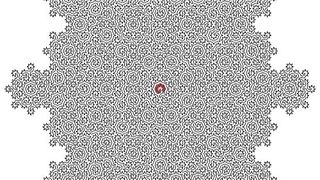Scientists created a maze-like fractal inspired by the movements of chess pieces. The ultra-difficult maze could help to improve our understanding of bizarre quasicrystals.

An image of the researchers’ fractal maze. (Image credit: The University of Bristol)
Physicists may have created the world’s most difficult maze using a chess sequence, and it could help them understand the properties of otherworldly quasicrystals.
The maze is an example of a Hamiltonian cycle — a path that visits all of the points on a graph at least once. The researchers were inspired by the movement of a knight around a chessboard. The result is an infinitely expandable fractal maze that describes the structure of quasicrystals. The researchers published their findings May 1 in the journal Physical Review X.
“When we looked at the shapes of the lines we constructed, we noticed they formed incredibly intricate mazes,” study lead author Felix Flicker, a physicist at the University of Bristol in the U.K., said in a statement. “The sizes of subsequent mazes grow exponentially — and there are an infinite number of them.
